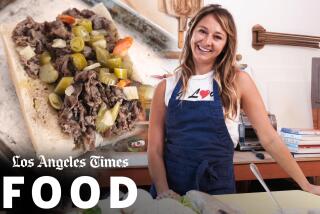Cooking Off the Fat : Diet: Researcher develops a way to make meat more lean. Critics call his method interesting but impractical.
- Share via
A Boston University researcher who turned his kitchen into a laboratory in hopes of reducing the cholesterol in his diet reported last week that he has developed a method of cooking meat that dramatically cuts its fat and cholesterol content.
The technique, in which the researcher extracted fat and cholesterol from ground beef by briefly heating it in vegetable oil, successfully cut the fat by nearly 70% and the cholesterol by more than 40%.
“It’s a rather simple way of making the meat a bit healthier,” said Dr. Donald M. Small, who reported his findings in the New England Journal of Medicine. “If you cooked a third of your meat this way, your cholesterol might go down eight or 10 points.”
Small’s method, which he hopes fast-food chains and food processors might adopt, met with less-than-unanimous acclaim from other researchers. Some said Americans would do better in fighting heart disease if they simply cultivated a taste for vegetarian cooking.
Dr. Walter Willett of the Harvard University School of Public Health said the new method could worsen what he described as the inefficiency inherent in U.S. meat production. Furthermore, he suggested Small’s approach would have little effect on health.
“The article is interesting, and everybody will learn something about the composition of meat,” Willett said. “But in terms of a practical way for reducing saturated fat and cholesterol intake, I think this is really not the direction we should be headed.”
Small, a professor of medicine and biophysics who has studied the physical chemistry of fats for 25 years, began experimenting in his Quincy, Mass., kitchen after realizing that he was “a middle-aged man with moderately elevated cholesterol.”
Small had already tried various diets. Compliance with strict, low-fat diets, he found, was extremely difficult. So he began improvising with cooking methods, knowing that saturated fat becomes highly soluble in vegetable oils at high temperatures.
“Instead of using the least amount of oil in the pan, if I used more, I might use the vegetable oil as an extractant,” Small explained. He took the end product to his lab, measured the fat and cholesterol and found it markedly reduced.
“Now I cook all ground beef this way,” Small said in a telephone interview. “It’s very easy to do, and it works.” He said the meat could then be used in spaghetti sauces, chili, meat loaf, casseroles, soups and other dishes, including hamburgers.
In the average American diet, 37% of calories come from fats, compared to 7% in some other healthy populations. Much of the fat in the U.S. diet is saturated, largely from animal sources, which may raise cholesterol levels in the blood.
About 99.8 million Americans have blood cholesterol levels above 200 milligrams per deciliter--a level that is considered elevated. High blood cholesterol levels are believed to increase a person’s risk of atherosclerosis, coronary heart disease and stroke.
For that reason, federal health officials have recommended a diet in which less than 30% of the calories are in the form of fat, with less than 10% as saturated fat. They have also recommended a daily limit of 300 milligrams of cholesterol.
In his experiment, Small heated ground meat in about a quart of safflower oil for about 10 minutes. Then he put the meat in a strainer, rinsed it with several cups of boiling water, removed any fat from the broth and returned the broth to the meat.
When Small compared the fat and cholesterol content of that meat to conventionally cooked meat, he found he had cut the fat content by an average of 67% and the cholesterol content by an average of 43%.
The approach can be used with beef, pork, lamb, other red meats and poultry, he said. Because fat in meat is interspersed between muscle cells, Small said his method is more effective than trimming fat or draining it off after cooking.
“In a relatively large population group over several years, this decrease might have an important effect on the prevalence of cardiovascular disease,” Small contended in the article.
Willett, who researches the health effects of dietary fat, called Small’s proposal interesting but impractical. He suggested it be judged in the context of “the big picture of the ecology and efficiency of food production.”
As Willett put it, cattle currently are fattened with grain harvested using energy resources from the Mideast, then are transported to stockyards. There, they are further fattened; after slaughter, the meat is refrigerated, requiring more energy.
“Now we are being asked to take vegetable oil, also grown with large inputs of Middle Eastern (resources), and to use that liquid vegetable oil to extract the fat from the meat that was put there at great cost,” he said. “Then we throw both of those away.”
More to Read
Eat your way across L.A.
Get our weekly Tasting Notes newsletter for reviews, news and more.
You may occasionally receive promotional content from the Los Angeles Times.









